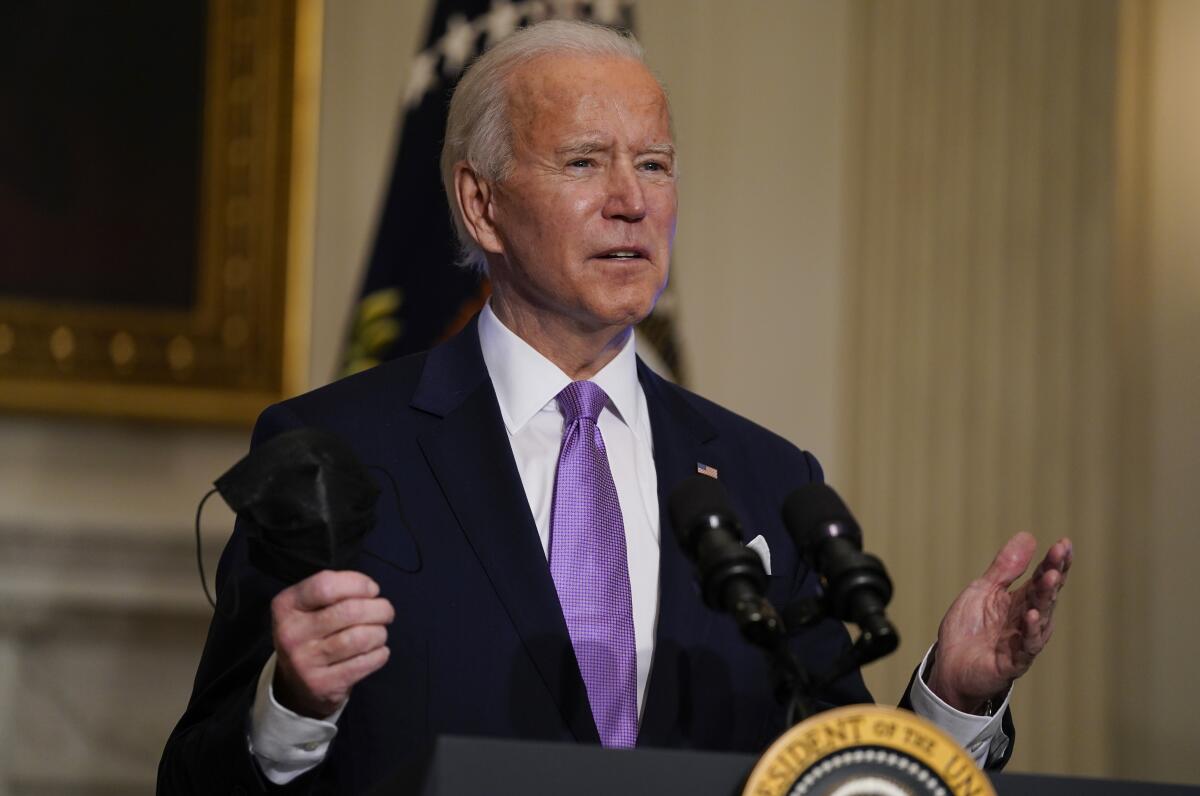Opinion: Biden needs to decide what ‘unity’ means

- Share via
I’m going out on a limb here and saying that Republicans and Democrats have very different ideas of what “unity” means. The fact that President Biden has been calling steadily for unity while his fellow Democrats are putting his predecessor on trial in the Senate leaves many Republicans with a severe case of cognitive dissonance.
Soon, however, Biden will have to make a choice about compromise and bipartisanship that will clarify what he means when he says he wants to end the politics of division and bring the country together. He and top congressional Democrats could settle for a limited COVID-19 relief bill that has bipartisan support, or they could use the budget reconciliation process to try to enact a much bigger and bolder package just with Democratic votes.
The bill forces a similar choice on Republicans. Do they want to abandon their newfound complaints about deficit spending and support Biden’s aggressive approach to the pandemic and the struggling economy? Or do they want to force the president to go the party-line route, which could lead to the very same outcome because they may not have the votes to stop a big bill?
Part of the calculation here is figuring out what moderate Senate Democrats will support, given that Biden would need all of them if he goes ahead without Republican backers. They’re among the group of 16 senators from both parties actively discussing what the next relief bill should contain. One of those Democrats, Sen. Joe Manchin of West Virginia, has said he’d like to see the bill do a better job targeting federal dollars to the people who need them the most. Republicans in the group echo that sentiment, while also suggesting that more time needs to pass before Congress passes another hugely expensive bill.
Some elements of Biden’s $1.9-trillion proposal, such as the bucketload of money to speed the distribution of vaccines, could pass easily on their own. Others, such as the call to raise the federal minimum wage to $15 an hour for all workers (eliminating the lower minimum for tipped workers in many states), would seem to have no prayer outside the context of a big emergency spending bill. Between those two poles are proposals to address a wide array of pandemic-related problems, such as extra expenses involved in reopening schools safely and the high cost of health insurance for those not covered by a large employer’s plan.
It’s worth recalling that the last time we had a recession, Congress stopped trying to stimulate the economy after passing the roughly $800-billion American Recovery and Reinvestment Act in 2009. Some economists argue that this turn toward austerity hampered the recovery, which proceeded at an unusually sluggish pace; Democrats have said they don’t want to make that mistake again. Instead, they’re following the advice of Federal Reserve Chairman Jerome Powell, who said in October that the potential downside of doing too little to boost the economy was far greater than the potential downside of doing too much.
That’s not the dominant Republican view at the moment. As Sen. Susan Collins (R-Maine) put it to Business Insider, “It’s hard for me to see when we just passed $900 billion worth of assistance why we would have a package that big. Maybe a couple of months from now, the needs will be evident and we will need to do something significant, but I’m not seeing it right now.”
So, having a big bipartisan hug over COVID relief would require Biden and his fellow Democrats to shrink their ambitions — and count on Congress not to shut off the spigot prematurely.
Which brings us back to how Biden defines unity. His comments Monday suggest that unity is about two things: turning down the “I’m right, you’re evil” rhetoric that’s poisoning politics, and delivering what most people want from government. Like, say, Biden’s proposal to send out $1,400 stimulus checks, which polls suggest the public strongly supports.
It’s not about giving up the power won last November or waiting for Republicans to join Democrats in voting for a bill. As Biden put it, unity is “trying to reflect what the majority of the American people — Democrat, Republican, and independent — think is within the fulcrum of what needs to be done to make their lives and the lives of Americans better.”
That’s why Biden seems comfortable with the idea of using reconciliation to push through a bigger stimulus bill than Republicans may be willing to sign on to. Senate Majority Leader Charles Schumer (D-N.Y.) is there too. “We want to work with our Republican colleagues to advance this legislation in a bipartisan way, but the work must move forward, preferably with our Republican colleagues, but without them if we must,” he said Tuesday, adding that the Senate could consider a budget resolution — a prerequisite for a budget reconciliation bill — as early as next week.
Republicans and right-wing media were quick to complain that Biden hasn’t acted in a unifying way in his first days as president, citing his executive orders reversing a series of (hotly disputed) Trump administration orders and policies. That’s a silly way to judge Biden’s approach to bipartisanship. A much better measure of his intentions is coming soon enough.
More to Read
A cure for the common opinion
Get thought-provoking perspectives with our weekly newsletter.
You may occasionally receive promotional content from the Los Angeles Times.











